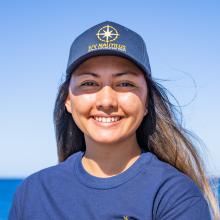
Darrian Muraoka
Tell us about your work/research. What kinds of things do you do?
While there are many avenues I have explored in my career in marine science, I am currently working with Waiwai Ola Waterkeepers Hawaiian Islands to obtain the goal of swimmable, drinkable, fishable waters for generations to come- specifically in Hilo. I am currently conducting a water quality analysis to observe legacy pollution in Hilo Bay. I also participate in outreach and education with our younger generations to build awareness of human-induced pollution within our watershed-specifically on our coasts where many 'ohana swim, fish, surf, and hoe wa'a.
What sparked your initial interest in your career?
My interest in marine science began at a young age. Being surrounded by the ocean and being from a lawai'a (fishermen) 'ohana (family), I was always on the water and curious about the ocean and how it always provided for us. Now that I'm older, living on the coast in Kekaha, Kaua'i, there are many ocean events (coastal flooding, large swells, erosion) that have occurred that I would like to address in my hometown in the face of climate change.
Who influenced you or encouraged you the most?
I feel that the community I come from and multiple communities I've gratefully been a part of has had an influence on me to continue in marine science. They've done this by teaching me the importance of our ocean and our Hawaiian coastlines through harvesting pa'akai, surrounding akule and other fish, collecting different types of limu, and giving to the people that make up this community. Being surrounded by these people as friends, family, and kumu has helped me to nurture and grow in this field.
What element of your work/study do you think is the most fascinating?
The most fascinating element of my work is the curiosity you can feel and the observations you can make while looking out towards the ocean, in a tide pool, or river and how they all connect.
What other jobs led you to your current career?
I believe any job can help you in your journey in science. In my undergraduate years at CSUMB, I had a hostess job at a fancy seafood restaurant in Monterey Bay. Through this job, I familiarized myself with all the seafood that was being sold in the restaurant which helped to familiarize me with species ID in my marine biology classes. I also volunteered a lot in Monterey; I volunteered as a guide at the Monterey Bay Aquarium, a research assistant for a graduate student in Moss Landing Marine Labs working in psychology (limu/algae studies) of the Elkhorn Slough. Lastly, I participated in the Pacific Internship Program for Exploring Science (PIPES) at UH Hilo which assisted me in interning with DAR Kaua'i and the NOAA Office for Coastal Management in the summers of 2018 and 2019. From there, I pursued my way through graduate school. By volunteering, you make many connections in the avenues you would like to explore and my biggest advice is to never stop exploring those avenues until you find a position you absolutely love doing.
What are your degrees and certifications?
Bachelors of Science Marine Science - California State University Monterey Bay 2019
Open Water Diving 2021
Tropical Conservation Biology and Environmental Science (Fall 2022)
What are your hobbies?
I love to run, go to the beach, paint, volunteer on community work days, and hike.
What advice would you give someone who wants to have a career like yours?
My advice is to never let anyone tell you you can't pursue marine science or that there are no jobs in this field that "pay well." Keep pursuing what you love and always remember your reason of your passion for this career! When in undergraduate science classes, never be afraid to ask questions and make time to go to tutoring and talk with your professors after class. Make friends with people in your field- they will eventually become your colleagues and peers. Always mahalo people that help you along the way. Volunteer your time with places you've never been before to connect to their people and their coastlines. Check your email for opportunities in your listserv emails and always explore different avenues of marine science as this career field is HUGE!
How did you get involved with the Ocean Exploration Trust?
I was forwarded an opportunity to become a research mapping intern and after talking with my friend, Kainalu, and his experience in his first expedition really drove me to apply for the Ocean Exploration Trust.
Expeditions
Darrian participated in the following Ocean Exploration Trust expeditions:
